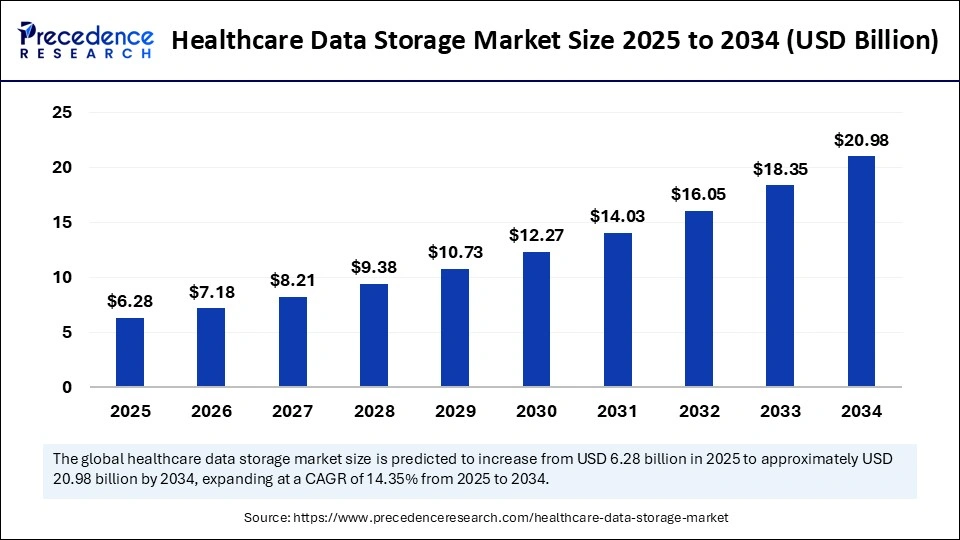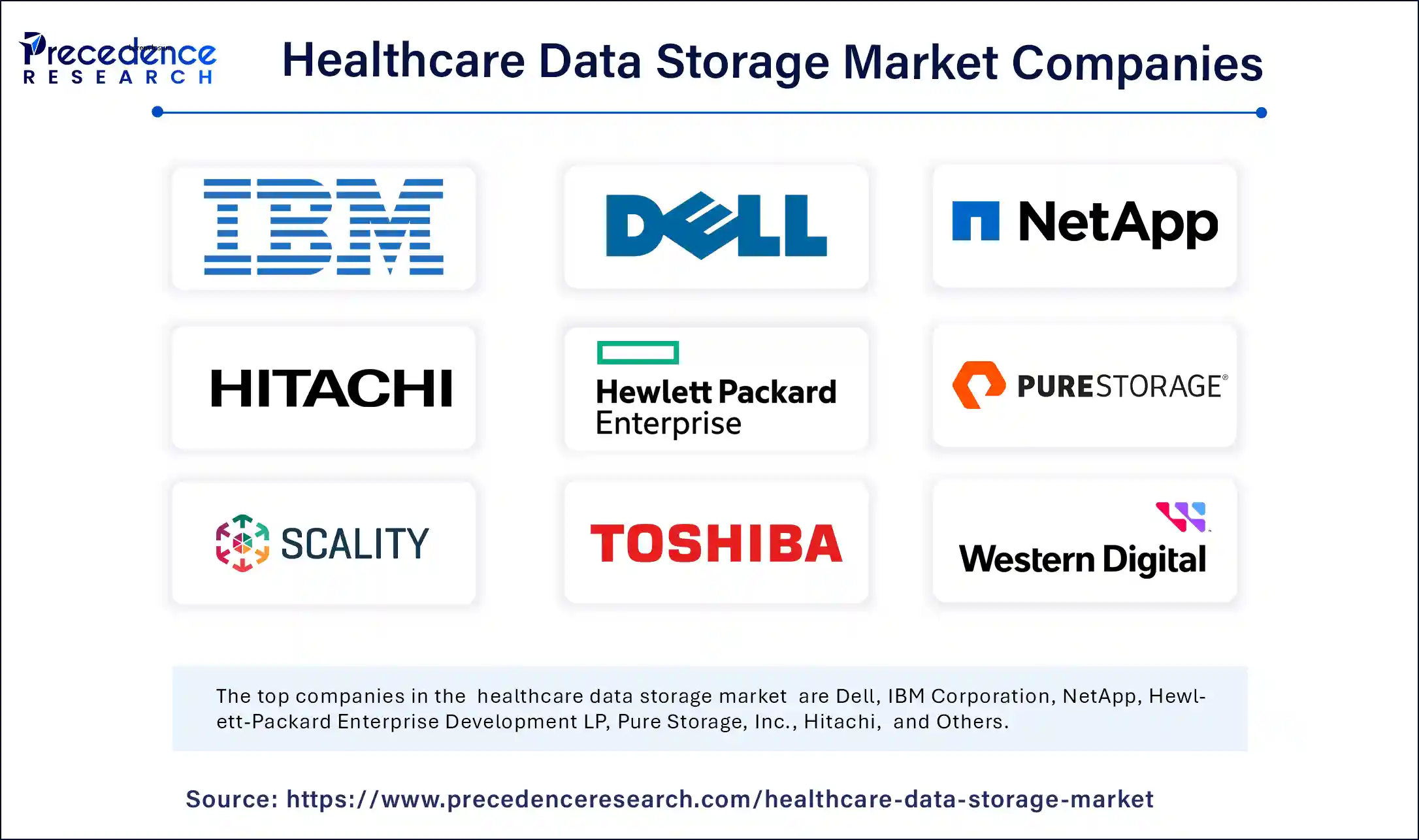
Healthcare Data Storage Market Key Points
-
North America accounted for the largest revenue share of the healthcare data storage market in 2024.
-
The Asia Pacific region is projected to register the fastest CAGR during the forecast period.
-
By storage type, cloud-based storage led the market with a 57% revenue share in 2024.
-
The hybrid storage segment is anticipated to grow at a significant CAGR of 18.1% from 2025 to 2034.
-
In terms of deployment mode, the private cloud segment contributed the highest revenue share of 46% in 2024.
-
The hybrid cloud segment is forecasted to grow at a strong double-digit CAGR of 20% during the projection period.
-
Among end-users, hospitals generated the largest revenue share of 61% in 2024.
-
The pharmaceutical companies segment is expected to expand at the highest CAGR of 19.2% from 2025 to 2034.
How is AI Transforming the Healthcare Data Storage Market?
AI is reshaping the healthcare data storage market by improving how vast amounts of medical data are managed, organized, and accessed. With the explosion of electronic health records, imaging data, and genomic information, AI algorithms help classify, compress, and retrieve data more efficiently. This reduces storage costs and enables faster access to critical patient information, enhancing clinical decision-making.
Moreover, AI enhances data security and compliance in healthcare storage systems. By detecting unusual access patterns and potential breaches, AI-driven cybersecurity tools protect sensitive health data. AI also supports automated data backup and disaster recovery processes, ensuring continuity and integrity of medical records. These capabilities make AI essential in managing the growing complexity and volume of healthcare data.
What Is Healthcare Data Storage and Why Is It Critical?
Healthcare data storage refers to the systems and technologies used to securely store, manage, and retrieve vast amounts of medical data, including electronic health records (EHRs), medical images, genomic data, clinical trial information, and administrative records. The rising adoption of digital health solutions like telemedicine, wearable devices, and AI-driven diagnostics has led to an explosion in healthcare data, making efficient storage solutions essential for operational continuity, patient care, and compliance with data regulations (e.g., HIPAA, GDPR).
Modern healthcare storage needs go beyond basic file keeping—they require scalable, secure, and fast-access platforms. Solutions range from on-premises infrastructure to cloud-based and hybrid storage models, often integrated with AI tools for data analytics and decision support.
Healthcare Data Storage Market Growth Factors
The healthcare data storage market is expanding rapidly, driven by an exponential increase in data from electronic health records (EHRs), medical imaging, clinical trials, and telehealth services. This surge is fueled by the COVID‑19 pandemic’s acceleration of digital health adoption, wearable devices, and remote monitoring systems. Providers are investing in scalable, secure solutions—including cloud-based, hybrid, and edge storage—to efficiently manage and analyze growing datasets. The integration of AI and machine learning tools within storage platforms enables predictive analytics, diagnostics, and personalized medicine, further amplifying demand.
Increased regulatory focus on data privacy and security (HIPAA, GDPR), along with initiatives like HITECH and health information exchanges, are pushing healthcare organizations to prioritize encrypted and compliant storage systems. Adoption of blockchain technology for tamper-resistant records and secure interoperability is gaining traction. Meanwhile, North America leads the market in adoption, while Asia-Pacific is emerging as the fastest-growing region, driven by digitization efforts and governmental health IT investments.
Market Scope
| Report Coverage | Details |
| Market Size by 2034 | USD 20.98 Billion |
| Market Size in 2025 | USD 6.28 Billion |
| Market Size in 2024 | USD 5.49 Billion |
| Market Growth Rate from 2025 to 2034 | CAGR of 14.35% |
| Dominating Region | North America |
| Fastest Growing Region | Asia Pacific |
| Base Year | 2024 |
| Forecast Period | 2025 to 2034 |
| Segments Covered | Storage Type, Deployment Mode, End User, and Region |
| Regions Covered | North America, Europe, Asia-Pacific, Latin America, and Middle East & Africa |
Market Dynamics
Market Drivers
The healthcare data storage market is being significantly driven by the explosive growth of healthcare data, fueled by the widespread adoption of electronic health records (EHRs), medical imaging, genomic sequencing, telemedicine, and wearable health devices. With healthcare providers generating massive volumes of patient data daily, there is a growing need for scalable, secure, and compliant data storage solutions. The increasing digitalization of healthcare systems across both developed and emerging economies is accelerating demand for cloud-based and hybrid storage infrastructures that offer real-time access, interoperability, and disaster recovery capabilities.
Moreover, the push toward data-driven decision-making, predictive analytics, and AI-powered diagnostics is further propelling the demand for advanced storage systems capable of handling large datasets efficiently. Compliance with regulatory frameworks such as HIPAA in the U.S. and GDPR in Europe is also compelling healthcare organizations to adopt secure and auditable storage technologies.
Market Opportunities
There are numerous growth opportunities emerging in the healthcare data storage landscape. One of the most promising is the adoption of hybrid cloud models, which combine on-premise control with the flexibility and scalability of cloud services, offering an optimal balance for healthcare institutions dealing with sensitive patient information. The increasing use of artificial intelligence and machine learning in healthcare applications creates an urgent need for high-speed, high-capacity storage solutions, especially as AI algorithms require access to vast, structured and unstructured datasets.
Another opportunity lies in the growing demand for long-term data archiving solutions, particularly for compliance and research purposes, where immutable storage and fast retrieval systems can be game changers. Moreover, as genomic and precision medicine initiatives expand, the requirement for storage capable of handling petabytes of data offers significant market potential. Healthcare providers are also increasingly seeking partnerships with technology vendors and cloud service providers to modernize their infrastructure, presenting ample scope for innovation and service expansion.
Market Challenges
Despite the promising outlook, the healthcare data storage market faces notable challenges. Chief among them is the rising threat of cybersecurity breaches and data loss, which can have severe implications for patient safety, institutional reputation, and regulatory compliance. Healthcare data is highly sensitive and a prime target for cyberattacks, making robust encryption, access control, and real-time threat detection essential. Additionally, the high cost of deploying and maintaining advanced data storage infrastructure—particularly for smaller hospitals and clinics—can be a significant barrier to adoption.
Legacy systems still in use in many institutions may be incompatible with newer technologies, complicating integration and modernization efforts. There is also a lack of standardization in healthcare data formats and interoperability protocols, which hinders seamless data sharing and storage optimization. Furthermore, the need to comply with diverse and evolving regulations across different jurisdictions adds another layer of complexity, particularly for global healthcare organizations.
Regional Outlook
North America currently leads the healthcare data storage market, largely due to its advanced healthcare IT infrastructure, widespread adoption of EHR systems, and strong regulatory frameworks such as HIPAA that drive investments in secure data solutions. The U.S. is particularly prominent, with high levels of digitalization in healthcare institutions and a rapidly growing emphasis on AI and big data applications in clinical settings.
Europe follows closely, supported by increasing digital transformation in public and private healthcare sectors and strict data protection regulations like GDPR that are accelerating the demand for secure storage platforms. The Asia-Pacific region is emerging as the fastest-growing market, driven by rapid healthcare infrastructure development, government-led digitization initiatives, and increasing awareness about the importance of data security in countries such as China, India, Japan, and South Korea.
These nations are also investing heavily in cloud technologies and AI integration, which complements the expansion of data storage needs. Latin America and the Middle East & Africa are still developing in this domain but are beginning to adopt cloud storage solutions and telehealth technologies, which will gradually boost demand for reliable and scalable healthcare data storage systems.
Roles of Key Companies in the Healthcare Data Storage Market
Dell
Dell provides scalable and secure data storage solutions designed for healthcare organizations. Its offerings support electronic health records (EHRs), medical imaging, and analytics, ensuring rapid access, data protection, and compliance with healthcare regulations.
IBM Corporation
IBM delivers advanced data storage and management platforms for healthcare, integrating cloud, AI, and analytics. IBM’s solutions help healthcare providers securely store, manage, and analyze large datasets, supporting efficient clinical workflows and regulatory compliance.
NetApp
NetApp specializes in hybrid cloud data storage and management, enabling healthcare organizations to move and manage data seamlessly between on-premises and cloud environments. NetApp’s technology supports EHRs, imaging, and analytics, with a focus on scalability and security.
Hewlett-Packard Enterprise Development LP (HPE)
HPE offers robust storage infrastructure for healthcare, including all-flash and hybrid systems. Its solutions are designed for high data volumes and fast access, supporting clinical and administrative data storage while ensuring security and compliance.
Pure Storage, Inc.
Pure Storage provides high-speed, all-flash storage solutions widely used in healthcare for real-time access to data, medical imaging, and EHRs. Their systems are valued for reliability, scalability, and efficiency in managing large healthcare datasets.
Hitachi, Ltd.
Hitachi delivers enterprise-grade storage and data management platforms for healthcare, supporting mission-critical applications such as imaging and EHRs. Hitachi’s solutions focus on reliability, security, and enabling big data analytics.
Toshiba Corporation
Toshiba offers reliable storage hardware, including hard drives and SSDs, for healthcare environments. Their products are used in medical imaging, data archiving, and backup solutions, supporting the secure storage of large volumes of health data.
Western Digital Corporation
Western Digital provides a range of storage products, from enterprise hard drives to flash storage, tailored for healthcare needs. Their solutions support high-resolution medical images, patient records, and research data, emphasizing durability and data integrity.
Scality
Scality specializes in object and software-defined storage, enabling healthcare organizations to manage massive, unstructured data volumes. Their solutions support medical imaging, genomics, and cloud archiving, ensuring security and compliance.
Huawei Technologies Co., Ltd.
Huawei offers scalable storage infrastructure for healthcare, including cloud and hybrid solutions. Their technologies support digital transformation, secure data management, and integration with AI-driven healthcare applications.
Fujitsu
Fujitsu provides integrated storage and data management solutions, focusing on reliability, security, and compliance for healthcare organizations. Their platforms support EHRs, imaging, and analytics to manage growing data volumes efficiently.
Samsung
Samsung supplies high-performance SSDs and memory solutions for healthcare data storage. Their products are used in medical devices, imaging systems, and data centers, supporting fast and secure storage of critical health information.
Drobo
Drobo offers simple, scalable storage appliances for healthcare, suitable for backup, archiving, and small-scale clinical data management. Their systems are known for user-friendliness and data protection.
Tintri
Tintri provides intelligent, VM-aware storage solutions that support healthcare virtualization and efficient data management. Their technology enables effective storage for EHRs, imaging, and analytics, with a focus on automation and performance.
Cloudian
Cloudian specializes in object storage solutions for healthcare, enabling secure, scalable storage of unstructured data such as medical images and research files. Their platforms support hybrid and multi-cloud environments, ensuring compliance and data durability.
Segments Covered in the Report
By Storage Type
- On-premise Storage
- Cloud-based Storage
- Hybrid Storage
By Deployment Mode
- Public cloud
- Private cloud
- Hybrid cloud
By End User
- Hospitals
- Clinics
- Research institutions
- Pharmaceutical companies
- Others
By Region
- North America
- Asia-Pacific
- Europe
- Latin America
- Middle East & Africa
Also Read: Live Biotherapeutic Products and Microbiome CDMO Market
Get this report to explore global market size, share, CAGR, and trends, featuring detailed segmental analysis and an insightful competitive landscape overview @ https://www.precedenceresearch.com/sample/6195
You can place an order or ask any questions, please feel free to contact at sales@precedenceresearch.com|+1 804 441 9344
- Arteriovenous Implants Market Enhance dialysis outcomes with advanced grafts, endovascular access, and AI-assisted precision - September 16, 2025
- Smart Retinal Implants Market Restore vision with wireless bioelectronic prosthetics and AI-powered retinal technologies - September 16, 2025
- Myopia Treatment Devices Market Size to Reach USD 38.51 Billion by 2034, Growing at a CAGR of 7.86% - September 1, 2025

